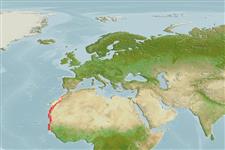Common names from other countries
Teleostei (teleosts) >
Gadiformes (Cods) >
Merlucciidae (Merluccid hakes)
Etymology: Merluccius: Latin, mar, maris = the sea + Latin, lucius = pike (Ref. 45335).
Environment: milieu / climate zone / depth range / distribution range
Ecology
Marine; demersal; oceanodromous (Ref. 51243); depth range 15 - 1248 m (Ref. 58452), usually 100 - 600 m (Ref. 58452). Tropical; 33°N - 12°N, 19°W - 8°W (Ref. 58452)
Eastern Atlantic: western North Africa from Cape Cantin to Cape Roxo.
Length at first maturity / Size / Weight / Age
Maturity: Lm 40.9 range ? - ? cm
Max length : 81.0 cm TL male/unsexed; (Ref. 1371); common length : 42.0 cm TL male/unsexed; (Ref. 1371)
Dorsal spines (total): 1; Dorsal soft rays (total): 47 - 51. Head rather long. Pectoral fin tips usually reaching origin of anal fin. Caudal fin usually truncate, progressively becoming concave with growth. Color is steel gray to blackish on back, silvery white on sides and belly.
Feeds mainly on small fishes, and to a lesser extent on crustaceans and cephalopods. Undergoes seasonal latitudinal migrations (Ref. 9709). Spawning takes place in northern areas from January to March (Doutre, 1960), and from October to March (López Abellán and Ariz Telleía, 1993). Marketed fresh or frozen (Ref. 58452). Minimum depth reported from Ref. 26999.
Life cycle and mating behavior
Maturities | Reproduction | Spawnings | Egg(s) | Fecundities | Larvae
Cohen, D.M., T. Inada, T. Iwamoto and N. Scialabba, 1990. FAO species catalogue. Vol. 10. Gadiform fishes of the world (Order Gadiformes). An annotated and illustrated catalogue of cods, hakes, grenadiers and other gadiform fishes known to date. FAO Fish. Synop. 125(10). Rome: FAO. 442 p. (Ref. 1371)
IUCN Red List Status (Ref. 130435)
CITES (Ref. 128078)
Not Evaluated
Threat to humans
Harmless
Human uses
Fisheries: highly commercial
Tools
Special reports
Download XML
Internet sources
Estimates based on models
Preferred temperature (Ref.
115969): 10.2 - 16.8, mean 14.1 (based on 28 cells).
Phylogenetic diversity index (Ref.
82804): PD
50 = 0.5000 [Uniqueness, from 0.5 = low to 2.0 = high].
Bayesian length-weight: a=0.00501 (0.00308 - 0.00816), b=3.10 (2.95 - 3.25), in cm Total Length, based on LWR estimates for this species & Genus-body shape (Ref.
93245).
Trophic level (Ref.
69278): 4.5 ±0.80 se; based on food items.
Resilience (Ref.
120179): Low, minimum population doubling time 4.5 - 14 years (K=0.07-0.17).
Fishing Vulnerability (Ref.
59153): High vulnerability (57 of 100).
Climate Vulnerability (Ref.
125649): High to very high vulnerability (75 of 100).
